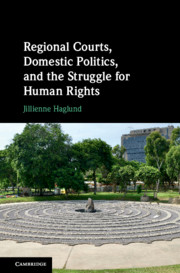Book contents
- Frontmatter
- Dedication
- Contents
- List of Figures
- List of Tables
- Acknowledgements
- 1 Introduction
- 2 Explaining Regional Human Rights Court Deterrence
- 3 Examining Patterns of General Regional Court Deterrence
- 4 Does the Executive have the Capacity to Respond to Adverse Judgments?
- 5 Is the Executive Willing to Respond to Adverse Judgments? The Role of Mass Public Pressure
- 6 Is the Executive Willing to Respond to Adverse Judgments? The Role of Elite Pressure
- 7 Amplified Regional Court Deterrence: High Executive Capacity and High Executive Willingness
- 8 Conclusion
- Appendix A Chapter 3 Appendix
- Appendix B Chapter 4 Appendix
- Appendix C Chapter 5 Appendix
- Appendix D Chapter 6 Appendix
- Appendix E Chapter 7 Appendix
- References
- Index
6 - Is the Executive Willing to Respond to Adverse Judgments? The Role of Elite Pressure
Published online by Cambridge University Press: 01 June 2020
- Frontmatter
- Dedication
- Contents
- List of Figures
- List of Tables
- Acknowledgements
- 1 Introduction
- 2 Explaining Regional Human Rights Court Deterrence
- 3 Examining Patterns of General Regional Court Deterrence
- 4 Does the Executive have the Capacity to Respond to Adverse Judgments?
- 5 Is the Executive Willing to Respond to Adverse Judgments? The Role of Mass Public Pressure
- 6 Is the Executive Willing to Respond to Adverse Judgments? The Role of Elite Pressure
- 7 Amplified Regional Court Deterrence: High Executive Capacity and High Executive Willingness
- 8 Conclusion
- Appendix A Chapter 3 Appendix
- Appendix B Chapter 4 Appendix
- Appendix C Chapter 5 Appendix
- Appendix D Chapter 6 Appendix
- Appendix E Chapter 7 Appendix
- References
- Index
Summary
In Chapter 6, I argue that regional human rights courts are more likely to deter future human rights abuses when the executive is willing to adopt, administer, monitor, and enforce human rights policy as a result of elite pressure. I argue that there are two types of elites important for generating executive willingness: economic elites and political elites. With respect to economic elites, I show that the executive is more willing to adopt, administer, monitor, and enforce human rights policy following an adverse judgment when the state is vulnerable to a loss of economic benefits, like foreign direct investment. With respect to political elites, I argue that the executive is more likely to adopt comprehensive human rights policy in expectation of national judicial or legislative implementation. I find evidence that national judicial implementation and subsequently executive human rights policy change, is more likely when the national judiciary is powerful. I argue that national legislative implementation of adverse regional court judgments is more likely as the size of the legislative opposition grows. I find limited support for the role of the size of the legislative opposition, and I suggest this may be due to key institutional design features of the legislature.
Keywords
- Type
- Chapter
- Information
- Publisher: Cambridge University PressPrint publication year: 2020

